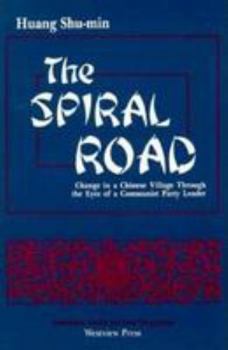The Spiral Road: Change in a Chinese Village Through the Eyes of a Communist Party Leader
Select Format
Select Condition 
Book Overview
Praise for the first edition: "An exceptional look at contemporary rural China.... The rural, peasant perspective of this book makes it dramatically different from others.... This compelling work... This description may be from another edition of this product.
Format:Paperback
Language:English
ISBN:0813309387
ISBN13:9780813309385
Release Date:October 1989
Publisher:Routledge
Length:240 Pages
Weight:0.85 lbs.
Dimensions:0.7" x 5.9" x 9.0"
Customer Reviews
3 ratings
communism in rural China
Published by Thriftbooks.com User , 24 years ago
An outstanding book that lets you see how communism worked in this village to transform the way of life. Mr. Shu-min was an American professor who had permission to spend time in this village. He made friends with the Man who was in charge, who had been born in 1946 a few short years before the communists won out. Change in village really started with the land reform of the early fifties, that tried to even out land ownership. Every thing went great for the first few years, production increased, life got better for everyone. The people became believers, then in 1958 Mao led them down the path of the insanity called the great leap forward with the establishment of the People's Communes. There was supposed to be rural industrial development by building backyard furnaces to make steel.They backed away from the farming and wasted time on the furnace. As this happened everywhere in China it led to starvation. It was made worse by local officials trying to meet assigned targets lying to higher officials about what was really happened. This led to their continuing down the wrong path. Not everything that happened in the village was such a disaster. Finally the village worked things out and started to build a better life for everyone. I found especially interesting the discussion of the way they handled birth control. Having male heirs to continue the family is of extreme importance to the Chinese. But also the curtailing of population increase means only one child per family. How all that is handled is extremely interesting. Really a fascinating story of how a well run village works.
A nicley done book.
Published by Thriftbooks.com User , 24 years ago
I read the book for my sociology class and I will say that I am impressed by it. It is written very well and Huang Shu-min did a great job conveying the changes in Lin Village after the Chinese Communist Party takes over CHina. The book can be challenging to people, especially those who are forced to read it. An I feel you have to have an interst of Asia to actually get into the book. So if you do have this intrest, I recomend that you buy it.
A novel of suspense in the jungles of New Guinea
Published by Thriftbooks.com User , 26 years ago
"Spiral Road" by Jan De Hartog This book is superbly written. Its characters are very realistic. The main character, Anton Zorgdrager, receives a "scholarship" to medical school from the Dutch government in exchange for several years of medical services to pygmies, aborigines, and natives of the jungles of Borneo, New Guinea, and other Dutch colonial East Indies islands. From his experiences with a series of atheists and Christians (Salvation Army soldiers) he becomes convinced that he has a gift (a sixth sense) that enables him to immediately recognize symptoms of the early stages of various diseases (leprosy, frambesia, satyriasis) that other doctors are unable to perceive. This leads Zorgdrager to hypothesize that God does not exist, and that the evils of mankind can be cured by a "serum of conversion" which he will discover and which will transform the patient into a God-fearing, pious individual. He, of course, expects someday to be the discoverer of such a vaccine. This hubris leads him into a series of failed human relationships. Self-obsession and thanatos ultimately cause him to forsake the comforts of civilization for the "purification" of his soul, alone in the heart of a terrifying jungle. The suspense is virtually nonstop (there is a somewhat incoherent dream sequence that briefly interrupts the suspense, but this was only a minor irritant in what was otherwise totaly captivating reading). I would put this book in the same class as "Shogun," as mesmerizing the reader with visually descriptive passages of the East Indies (climate, scenery, culture, and humorous accounts of bureaucracy) and intricate character development. It is also reminiscent of Hermann Hesse's "Steppenwolf" and Joseph Conrad's "Heart of Darkness," as it is difficult to resist becoming intensely involved with Zorgdrager's character in solitude as the book reaches its climax.






